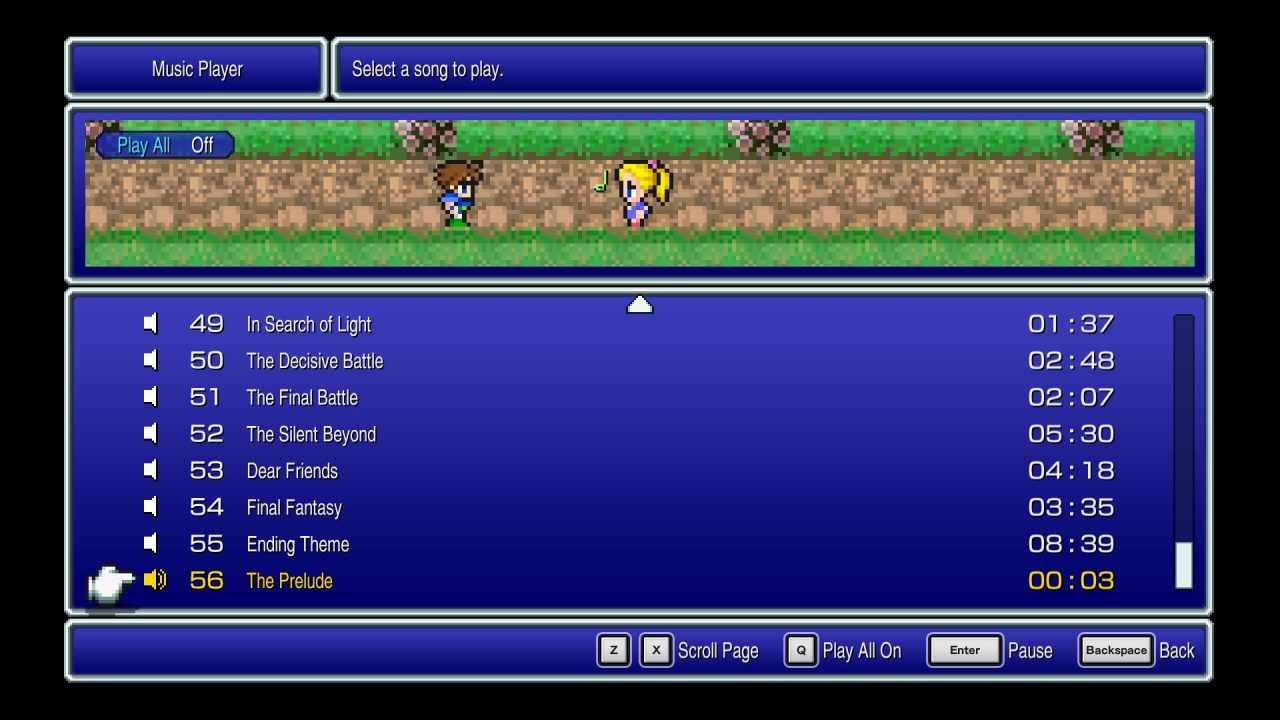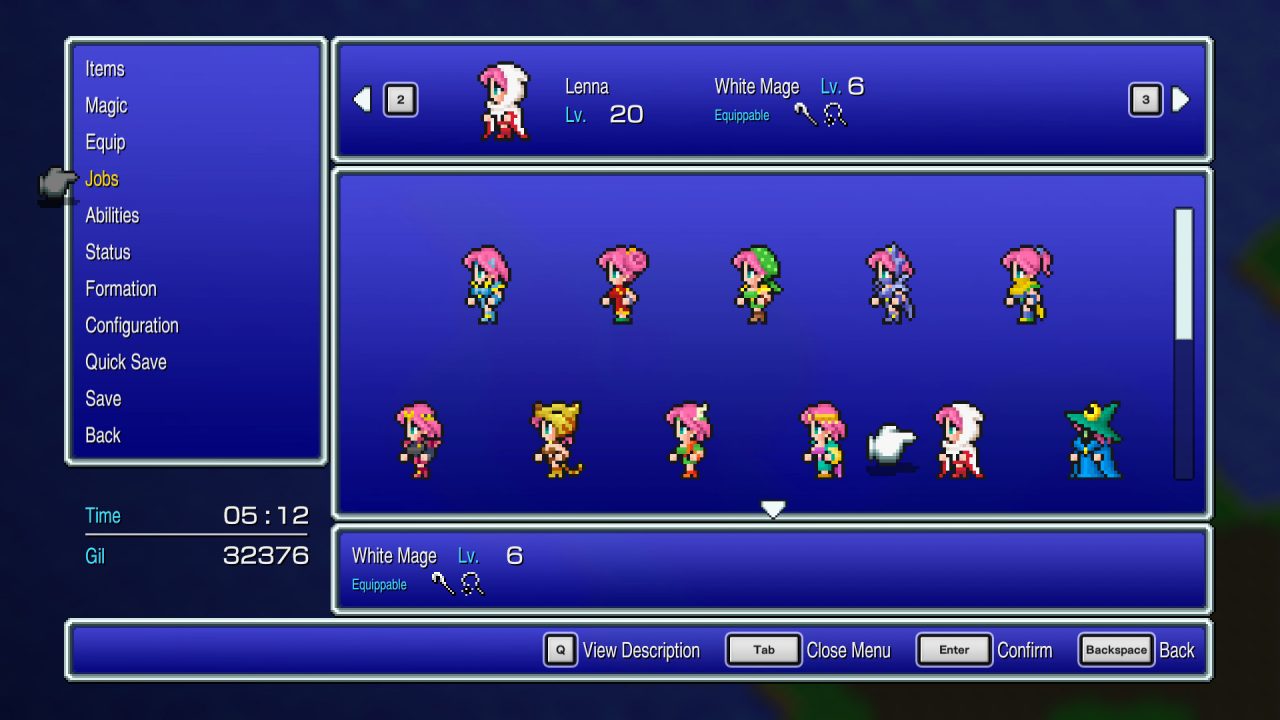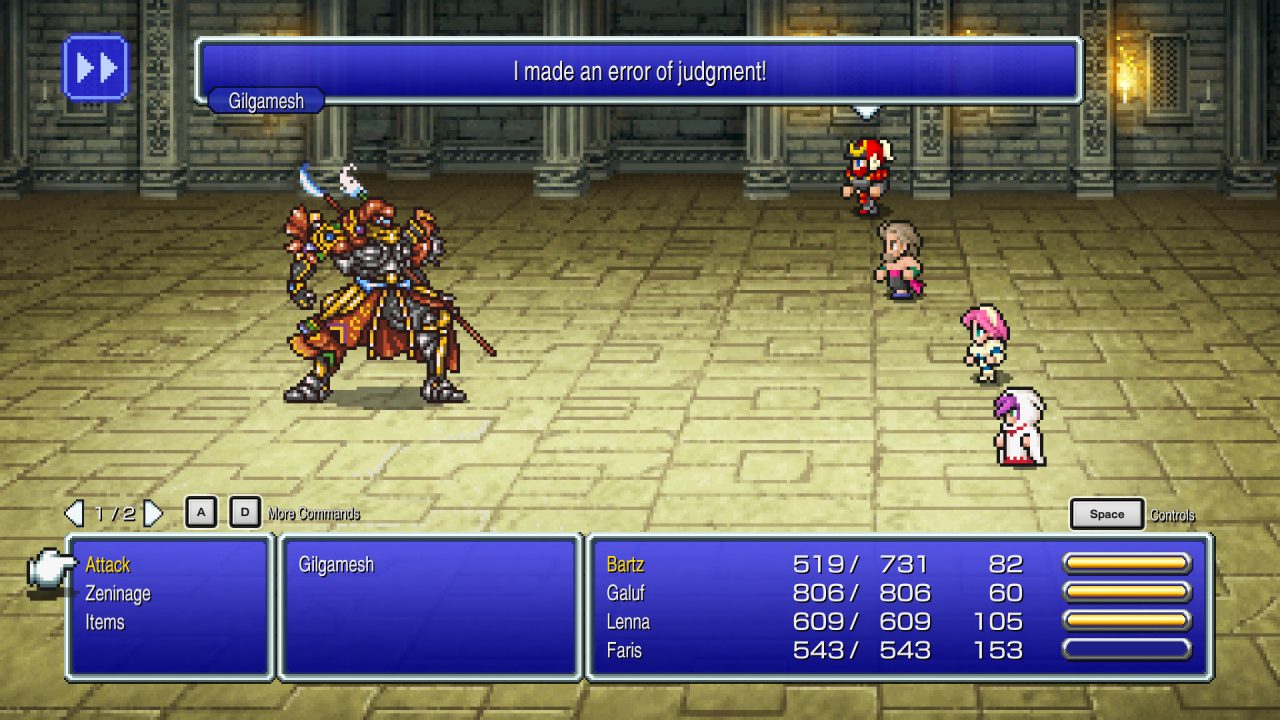In isolation with its Super Famicom/SNES counterparts, Final Fantasy V is a bit of an odd duck. Sandwiched between the character drama of Final Fantasy IV and the beautiful, multi-faceted epic of Final Fantasy VI, it’s easy to see why Bartz’s adventures were overlooked at first glance. I was certainly guilty of that. But comparing Final Fantasy V to its predecessor and sequel is a little bit unfair. One is many people’s first RPG (and many’s first favourite), and the other is widely regarded as one of the best RPGs ever.
You see, Final Fantasy V isn’t interested in redemption arcs, nor is it interested in tales of rebellion. Instead, it’s all about having a good old-fashioned adventure full of fun and warmth, with some costume changes along the way. I initially dismissed Final Fantasy V because of its lack of a grand, intricate story or memorable characters years ago. But it also didn’t have the smoothest ride over to the West in general. From the poor load times of the Anthology version to the compressed sound of Advance, to whatever these visuals are, there’s never been a definitive version. Until now, at least.
I think the Pixel Remaster for Final Fantasy V is one of the most deserving of the six because it gives people like me the chance to go back and find out what we missed out on and why we were wrong for dismissing the game initially. Or, if you were already in the know, you get to re-experience one of the most enjoyable entries in the Final Fantasy series all over again, now with a new lick of paint. Seriously, this is easily some of the most fun I’ve had with a Final Fantasy title (not numbered XIV) in a long time.
Final Fantasy V is completely different from both IV and VI in many different ways, but most importantly, in tone. And the enhanced visuals of V‘s Pixel Remaster do so much to emphasise this. The detail and colour of every environment and every sprite jumps out of the screen. You can see the water glistening inside the Pirates’ Hideout, and every single leaf on every single tree in every single forest is shaded and outlined delicately and perfectly. It’s a fiesta of pixelated colours and sights that made me feel like a little kid going on an adventure. The Ship’s Graveyard misted over with fog, and the interior of the Fire Ship are among some of the most memorable locations for how unique and enticing they looked. Even the bricks in caves and ruins through the game, where I felt like you could see every tiny grain on the surface, incited wonder.

The rearranged score only adds to this feeling of excitement, adventure, and warmth. We already know how this team of arrangers has done the first four games justice, and Final Fantasy V‘s updated score follows suit. For V in particular, the arrangers seem to have taken a shine to Celtic instrumentation, with “Home, Sweet Home” and “Harvest” using pipes and banjos to create a nostalgic homecoming or a homely jig, respectively. The “Main Theme” is propulsive and light, and it makes me want to get on a boat and go exploring. And you know what, we’ve had hundreds of versions of “Battle at the Big Bridge,” but this one might be my favourite. When you hear the trumpet, you’ll understand why. Of course, I’m cherry-picking, but I could gush all day about the care and attention the team has paid to Nobuo Uematsu’s original score for each remaster, and V‘s is no exception.
If the Pixel Remasters have made themselves famous for their updated visuals and music, then the original Final Fantasy V is easily most famous for its job system, and for good reason. All of that early experimentation in Final Fantasy III pays off in tremendous ways as the team fine-tuned the system in V. There’s no temporary penalisation for trying out new jobs, nor are you ever required to use any particular job. And all but one of the jobs are collected during the main story. The four additional jobs from the Game Boy Advance version are missing, but with 22 jobs to mix and match, there’s still so much to come back and mess around with that you’ll hardly notice.
I’m kind of amazed at just how well the job system in Final Fantasy V holds up. Swapping between jobs is as simple as hopping into a menu, and V allows you to learn abilities from jobs by levelling them up, and then you can equip them on another job. Each job has an innate ability, with one additional slot. So, if you want, you can have a ninja who casts blue magic or a dancer that can throw shurikens. You can play around with whatever combinations to your heart’s content. And I did! I even got sidetracked so many times just grinding for new abilities so I could cross-skill with other jobs. After all, what’s a samurai without dual wield? And why have we barely seen mystic knight again?

You can make pretty much any job work as long as your team’s composition compliments them, but some jobs are much less useful than others. Monks and knights are good early-game jobs but fade out when ninjas, mystic knights, rangers, and more come into play. And red mage suffers terribly by being limited to only level three black and white spells, which means other than their final ability (dualcast), they become very useless very quickly. Some jobs also require a ton of knowledge and investment to get the best out of them, like chemist and blue mage. But, once you do, you can crack the game wide open, which is its own kind of reward.
There are times your knowledge of the system will come into play, so while you’re not required to use any job at any time, you’ll find it harder running through with a team of all physical fighters or all mages at some points. Final Fantasy V is one of the more moderately challenging games in the series on a casual playthrough, and the Pixel Remaster seems to be consistent with that. Some bosses (looking at you, Liquid Flame) have particular patterns that change depending on how you attack them and missing the cue or bringing the wrong job can result in an instant wipe. From the halfway point, even enemies on the world map can pose a huge problem, including monsters with health bars in the 20k range when I’m running around as a level 17 ranger.
Luckily, the Pixel Remaster autosaves every time you enter a new room, and there’s an easy quick save in the menu for extra security. This does help alleviate some of the difficulty, but if you’ve been stubbornly running with a party of white mages for 10 hours and find yourself locked in, then you might have to do a bit of grinding. For some, that’s part of the beauty of Final Fantasy V — figuring out how to make any kind of party work in every situation — but going in blind can make things a little rough on a newcomer.
Despite alluding to it earlier in a positive light, I think Final Fantasy V‘s story is its weakest asset. I definitely have more of an appreciation for the lighthearted tone and the cheery main party now compared to my first attempt some 15 years ago—perhaps because it captures the spirit of adventure so well, or because the game is liberal with humour that made me laugh out loud multiple times. It’s got heart, which puts it a step above the NES titles for sure. Bartz is an endearing main character with the most adorable chocobo friend in Boko, and Lenna, Faris, and Galuf make a memorable team who all come together to help each other, not just save the world. You can see the glue that holds the team together as they prod and jab at one another, their sprites laughing and jumping around, and it put a smile on my face every time.

But, as I mentioned, the story is the weakest part, and by the time the standard Final Fantasy “save the world” plot comes in, it becomes even more by the numbers and loses a lot of the charm the first half of the game embraces. The main villain, Exdeath, lacks any meaning other than being an imposing, all-powerful warlock. He doesn’t have the pathos of Golbez or even the presence or fall from grace of Garland from the first Final Fantasy. Luckily, I was just happy to be along for the ride in this case, and Gilgamesh more than makes up for any lacklustre villains. His reputation and repeated appearances throughout the series are justified from his scene-stealing moments in this game.
Beating Final Fantasy V for the first time through the Pixel Remaster puts me pretty close to beating every game in the series. But because I got to it so late, I realised something important about it that made me appreciate it even more. Final Fantasy IX wasn’t the first title to look back at all that came before it — Final Fantasy V is a loving homage to the series up until that point. In particular, it looks back fondly at the NES trilogy and updates the mechanics, structure, story, and gameplay, all while retaining that traditional turn-based combat and wonderful music. Even the sometimes frustrating dungeons and bosses stick around for much-needed reminders of the good old days.
Because of this, Final Fantasy V has a unique spirit amongst the other Super Famicom/SNES titles. VI does have some elements of customisation, and IV has its moments of silliness, but the core of V is to embrace the fun and experimentation and lose yourself in the adventure. Sometimes, I forget to do that when I’m playing a video game, particularly a Final Fantasy game. So, for that alone, I’m glad I gave the Pixel Remaster of Final Fantasy V a chance.


